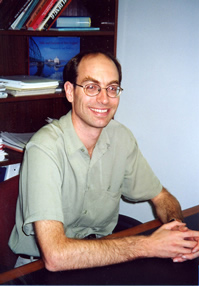Joel Tickner
UMass Environmentalist Looks Forward to Make a Difference
By Ryan Grant
|
"I love my job. I love my job because it's...about trying to make the world a better place..." says environmentalist Joel Tickner, the project director of the University of Massachusetts Lowell's The Lowell Center for Sustainable Production. Born in Chicago, but raised in Connecticut, Tickner had always thought he'd end up a medical doctor, but while attending college in Maine, during his senior year, he had a change of heart.
Tickner's latest project, The Lowell Center for Sustainable Production, deals with local organizations to search for safer forms of production and consumption. Tickner divides his job into two parts, "The first very important concept of environmental law called the precautionary principle, which is just the common sense 'look before you leap', 'act in the face of uncertainty', and taking that concept and saying, 'what does that mean in science and in public policy and decision making'; how do you take a very good idea and put it into practice?" Tickner borrows from our neighbors across the pond in the second area of his job. "The other area is in chemicals regulation, where we're taking some very forward-looking ideas from Europe, which are about dangerous chemicals should be replaced with safer alternatives and putting that into, saying what would that mean for the United States." When some people who don't see eye-to-eye with environmentalists like Tickner look for the 'quick fix', Tickner and his colleagues prefer to search for real solutions, "the health of our environment is critical to our own health, and what we need is people who are practitioners, who can go out there and understand the underlying causes of problems, not just put 'band-aids' on problems." In an industrious, economy-first society like ours, environmentalist are forced to meet opposition head-on, "it's challenging, it's frustrating at times, but I've learned that even in the worse times you need to have a forward-looking vision, and really come up with solutions," he adds, "so, you need creativity, you need to have science, you need to have policy." People in this profession can't take on such a large task themselves, Tickner and his colleagues call on us for help to start the change, "it's an exciting time, there's so many big challenges that need the help of students." |
 "I took two environmental courses, and just loved them and realized that that was what I wanted to do," Tickner returned to Spain, where he had spent a whole year earlier in his college career, to study biology. After that, Tickner came back to the states, to the University of Montana, where he completed a Masters of Science in Environmental Studies. While in Montana, Tickner worked with various groups and organizations to address various environmental issues. He then took his masters and his experience with him here to the University of Massachusetts Lowell, where he actually, and kind of ironically, ended up becoming a doctor when he earned a doctor of science degree from the Department of Work Environment.
"I took two environmental courses, and just loved them and realized that that was what I wanted to do," Tickner returned to Spain, where he had spent a whole year earlier in his college career, to study biology. After that, Tickner came back to the states, to the University of Montana, where he completed a Masters of Science in Environmental Studies. While in Montana, Tickner worked with various groups and organizations to address various environmental issues. He then took his masters and his experience with him here to the University of Massachusetts Lowell, where he actually, and kind of ironically, ended up becoming a doctor when he earned a doctor of science degree from the Department of Work Environment.